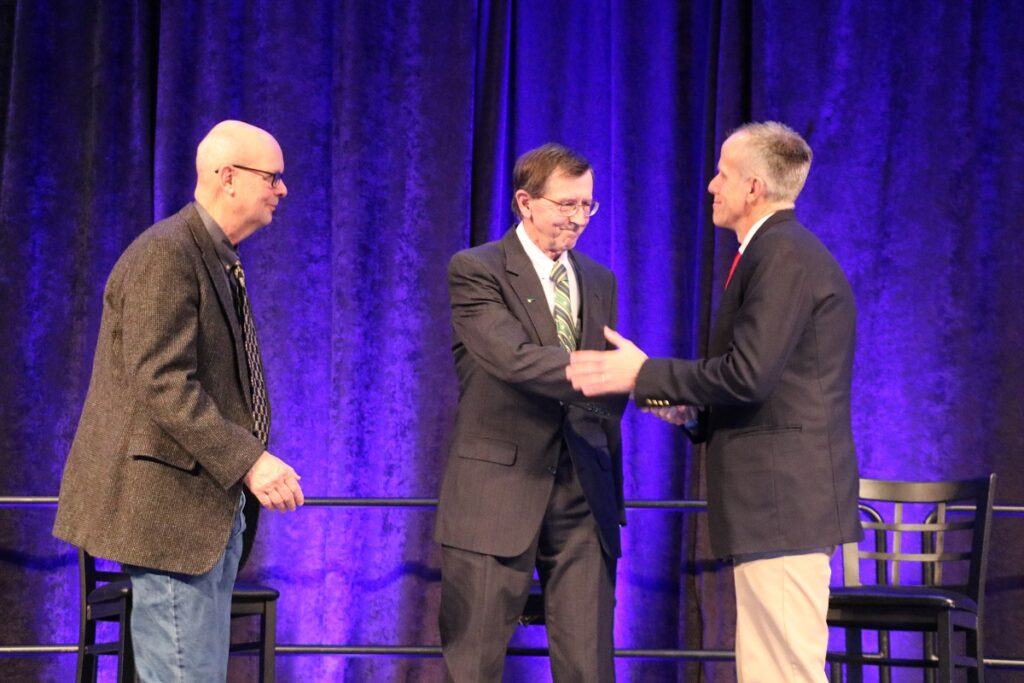
Fargo, N.D. — A new endowed professorship at North Dakota State University (NDSU) will ensure that soybean breeding research continues to thrive in North Dakota.
During the recent Northern Corn and Soybean Expo held at the Fargodome, the Ted Helms Endowed Professorship at NDSU was announced by Greg Lardy, NDSU vice president for Agricultural Affairs, together with Joel Thorsrud ’73, a Hillsboro, North Dakota, soybean farmer, and Ted Helms, a retired NDSU soybean breeder.
In 1986, one year after the North Dakota Soybean Council was established, the council worked with NDSU to begin funding the NDSU soybean breeding program, which included the opportunity to hire Helms.
“Dr. Helms’ varieties have enabled farmers to thrive in spite of the short growing season, withstand extreme climate settings from drought to flood and harvest a crop even in the tough years,” Kendall Nichols, North Dakota Soybean Council director of research, said. “Due to growing global demand, North Dakota soybean acres continue to expand, while offering profitable options for farmers in their planting rotations.”
Thorsrud established a legacy gift to endow the soybean breeding position at NDSU in honor of Helms. Thorsrud wanted to make a legacy gift to support NDSU agriculture and the soybean program. After meeting with NDSU agriculture leadership, he learned that the most impactful gift he could make was to endow a professorship.
“I saw how very important it was to develop these varieties that did well in North Dakota. My association with NDSU and agriculture is very strong. So, I thought that certainly a portion of my estate should go towards agriculture and NDSU.
“I saw the different needs and the NDSU soybean breeding program was number one,” Thorsrud said. “Their number one need was my number one desire and that was for the soybean breeding program to grow. NDSU has some wonderful ways that we can support farmers and the research that is needed to keep farmers productive and profitable.”
Endowed professorships are crucial for universities to recruit and retain the highest-quality faculty — expanding research, enriching the academic environment and attracting the brightest students. This endowed professorship will allow NDSU to continue building on the excellence in soybean breeding established by Helms.
“When this legacy gift is realized, it will support a faculty member in the NDSU Department of Plant Sciences in soybean breeding and allow NDSU to stay at the forefront of soybean breeding,” Lardy said. “It will provide funds that will expand research capacity and teaching methodologies to create superior soybean breeds that will benefit North Dakota farmers, as well as enrich the academic experience for hundreds of students in the future.”
“One of my most important goals was to always serve the family farmers to give them more value and to help farmers with their bottom-line profitability,” Helms said. “I am very honored. The most important thing is that this program is going to be supported and farmers are going to continue to be well-served by the NDSU research program.”
As NDSU’s soybean breeder for 33 years, Helms’ work made it possible for soybeans to grow from a minor crop to the production of over seven million acres in North Dakota in 2021. During his time at NDSU, 40 varieties of soybeans were developed.
“Ted has been very responsive to the needs of the farmers and the varieties that can grow in North Dakota’s very short and adverse growing conditions,” Nichols said. “He would never release a variety that he wasn’t 100% confident in.”
“We are grateful to Ted Helms for his work to build a strong, thriving soybean breeding program that has and will have, a lasting impact for generations to come; to Joel Thorsrud for his long-time commitment to the soybean industry and his legacy gift to support NDSU and agriculture so that together we can continue to grow and thrive long into the future,” Lardy said. “Thank you to every soybean farmer for your collective work to support agricultural research, your land-grant institution and the future of agriculture.”